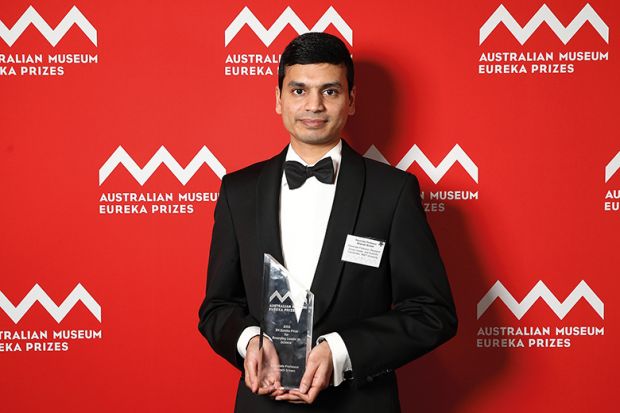Things have changed since the days when promising antipodean inventions were snapped up by rich overseas companies, according to the new head of the representative body for Australian scientists and technologists. But there is still a long way to go.
RMIT University electronics engineer Sharath Sriram said Australia needed two things to build a commercialisation culture to match its innovation culture. One was better integration of the disparate schemes to help researchers develop their ideas. The other was enough funding to shepherd those ideas across the “seven to 15-year horizon” of success.
This required “seamlessness” between programmes “so that one can flow into another”, said Professor Sriram, named Science & Technology Australia (STA) president on 28 November. “And [we need] investment revenue to hold the whole thing together. We’ve been advocating for a research translation future fund similar to the Medical Research Future Fund.”
As STA policy chair since 2018, he has kept a close eye on developments. “There have been a lot of positive shifts in the last three to five years,” he said. A key advance was the former government’s University Research Commercialisation Package.
It featured a A$1.6 billion (£837 million) fund to support translation and commercialisation activities, known as “Australia’s Economic Accelerator”. Other elements included the National Industry PhD Programme and the Trailblazer Universities scheme, which funds manufacturing-focused research and industry hubs.
Professor Sriram also hailed the current government’s Industry Growth Programme and National Reconstruction Fund. But many of these schemes lacked longevity and connectedness, he said: “[They] tend to be operated by different agencies, and it’s really funding over a shorter period.”
He reserved special praise for the longstanding Cooperative Research Centres (CRC) Projects stream, which matchmakes small or medium-sized companies with research organisations. While it was small in scope, with grants capped at A$3 million for three-year collaborations, he said, it had two distinct advantages.
One was connectivity, with many participants progressing into commercialisation funds run by the industry growth centres. The other was feedback for unsuccessful applicants: “It’s one of those rare schemes where there’s actually a loop. You apply; you learn why you missed out. You work on that, then try again. I’ve seen so many projects go from very early stage to significant maturity.”
One of those success stories is REMi, a smart monitoring system launched by Melbourne company Sleeptite using technology developed by Professor Sriram’s Functional Materials and Microsystems research group. It features stretchable sensors that gauge older people’s movements and vital signs, embedded in a medical grade mattress, and a data analysis platform that notifies remote carers of health risks, falls or distress.
Professor Sriram is credited with initiating commercial partnerships that have earned RMIT more than A$6 million over the past five years. Many have yielded medical devices harnessing his breakthrough technologies in nanoelectronics.
He said he had switched his focus from semiconductors after leaving his native India, partly inspired by Australia’s vastness. “Our simple vision is, how do you bring the hospital to the home?
“Most of the products we make are focused on that: aged care monitoring, early detection of viruses or cancer, [using] data science to look at [indicators] of heart failure, with saliva so you’re not drawing blood. Screen people rapidly; the data can be analysed [by] a city specialist. Take medicine to the place of need.”
Register to continue
Why register?
- Registration is free and only takes a moment
- Once registered, you can read 3 articles a month
- Sign up for our newsletter
Subscribe
Or subscribe for unlimited access to:
- Unlimited access to news, views, insights & reviews
- Digital editions
- Digital access to THE’s university and college rankings analysis
Already registered or a current subscriber? Login










